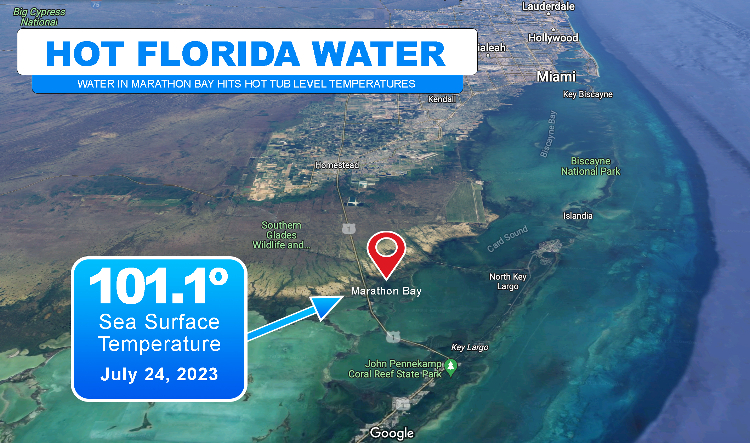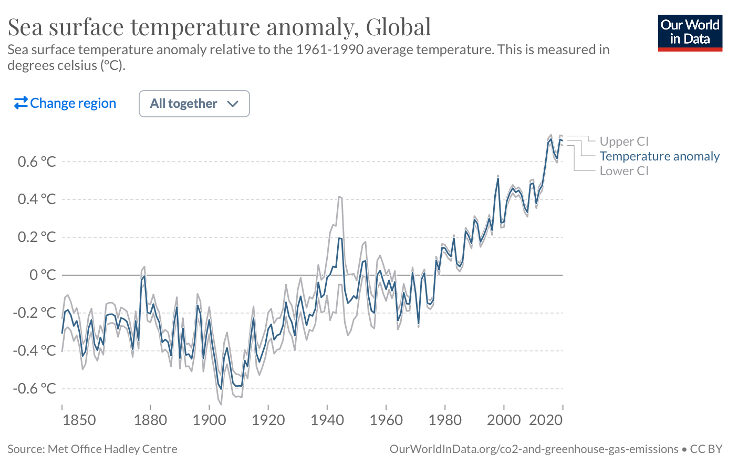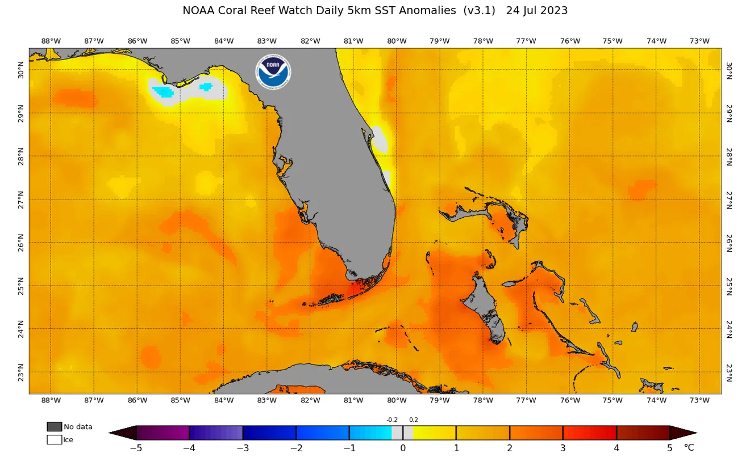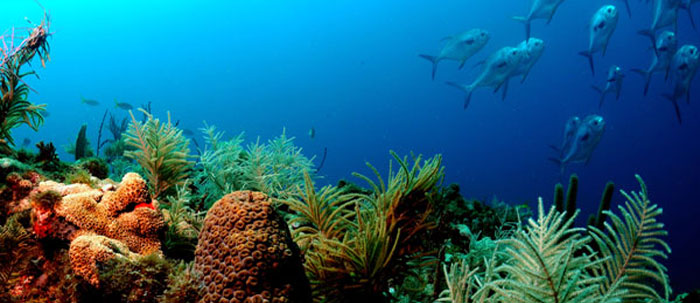Title image courtesy NOAA/National Marine Sanctuaries
May be a new world record!

Image credit: Google Maps
Those along the Florida Keys looking to cool down by dipping their toes in the water were certainly in for a surprise in July. The water temperature in those south Florida waters has been warm, maybe the warmest seawater ever seen anywhere in the world.
The National Oceanic and Atmospheric Administration (NOAA) measures the world’s sea surface temperatures (SST) with temperature sensors on satellites, buoys, ships, ocean reference stations, and through marine telemetry.
Data shows that the SST at the buoy in Manatee Bay (between the Everglades and Key Largo in the Florida Keys) named Station MNBF1 hit hot tub levels, exceeding 100 degrees two days in a row on July 23rd and 24th. Meteorologists say it could be the hottest seawater ever measured in the world.
The National Weather Service (NWS) says there is some uncertainty with the reading. But that Manatee Bay buoy hit 101.1 degrees Fahrenheit (38.4 degrees Celsius) Monday evening, according to NWS meteorologist George Rizzuto. The night before, that buoy showed an online reading of 100.2 F (37.9 C).

Global oceans have been steadily warming Credit: OurWorldInData.org
So is it a record?
Weather records for SST are unofficial, and there are certain conditions in this potentially record-setting reading that could disqualify it for the top mark.
While it’s true that there aren’t official water temperature records, there was a 2020 study that listed a 99.7 F (37.6 C) reading in the Persian Gulf in Kuwait Bay in July 2020 that was considered the world’s hottest recorded SST.
The Climate Adaptation Center will continue to follow this story and update it when NOAA makes a decision on whether or not the buoy’s data is accurate, setting the new world record.
It may not be accepted as a record because the area is shallow, has sea grasses in it and may be influenced by warm land in the nearby Everglades National Park.
Record or not, scientists say that these water temperatures are incredible and a real concern.
Is the water really as warm as a hot tub?
Yes! Hot tub maker Jacuzzi recommends water between 100 and 102 degrees F (37.8 and 38.9 C), so this water is indeed as warm as a hot tub.

Ocean temperatures relative to the seasonal average Credit: NOAA
.
Concerns about water this warm
Increasing ocean temperatures affect marine species and ecosystems, causing many issues.
Less oxygen
Warmer oceans decrease the oxygen content of the water, through a process called deoxygenation. Warmer ocean water holds less oxygen and is more buoyant than cooler water. This leads to reduced mixing of oxygenated water near the surface with deeper waters, which naturally contain less oxygen.
Warmer water also raises oxygen demand from living organisms including fish. It’s a bad and often deadly combination.
Rising sea levels
As ocean temperatures rise, sea levels rise as well. This is because water molecules expand from increasing temperatures, taking up more space. This erodes coastlines, threatens infrastructure and contaminates freshwater with intruding saltwater.
Coral bleaching
Coral bleaching is the process when corals become white due to various stressors, such as changes in temperature, light, or nutrients.
When water is too warm, corals expel the algae (zooxanthellae) living in their tissues causing the coral to turn completely white. That algae is critical for its survival. Reef corals build homes for millions of species of marine life, they support healthy ocean food webs, and they protect our coastlines. In fact, they substantially reduce coastal flooding and erosion by dissipating as much as 97 percent of incident wave energy.
Where bleaching is not too severe, the zooxanthellae can repopulate from the small numbers remaining in the coral’s tissue, returning the coral to normal color over a period of weeks to months. Some corals, like many branching corals, cannot survive for more than 10 days without zooxanthellae.
More intense hurricanes
Warm ocean water is fuel for hurricanes. Extreme warm ocean water breeds stronger, bigger and wetter storms. It gives hurricanes the energy they need to grow and sometimes rapidly intensify.
No relief in sight
As the atmosphere continues to warm, concerns continue to grow.
July was confirmed as Earth’s warmest on record of any month, according to a Copernicus Climate Change Service report on Tuesday. It shattered the previous July 2019 record by 0.59 degrees F (0.33 degrees C).
The world also just went through the hottest June on record, according to data from the Copernicus Climate Change Service, NASA and the National Oceanic and Atmospheric Administration.
Meanwhile, Florida is in the middle of an August heatwave, even by Florida standards. The NWS has issued somewhat rare excessive heat warnings for Florida, as heat index values soar up to 115 degrees F.
An average of 700 people died every year in the U.S. between 2004 and 2018 of heat-related causes, according to the CDC, and 3,066 heat-related deaths occurred during 2018-2020. According to data from the National Conference of Citizenship, heat-related deaths in Florida have increased 88% in the last three years.
The CAC needs your support
As Earth continues to warm, our lifestyle and future continues to be in jeopardy. The CAC is a non-profit organization committed to protecting the Florida way of life in a time of global climate change.
Our mission is to connect the scientific community with the public sector and private enterprise to apply climate science to solving Florida’s unique challenges.
This takes financial support from our local community. If you would like to support the CAC so it can ensure Florida’s future, you can do so here. We can’t do it without you.

